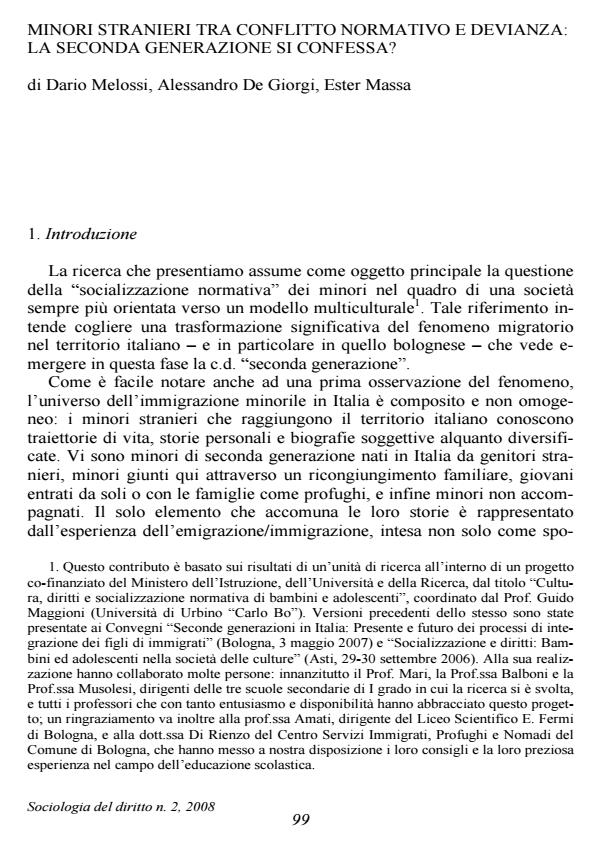Minori stranieri tra conflitto normativo e devianza: la seconda generazione si confessa?
Journal title SOCIOLOGIA DEL DIRITTO
Author/s Dario Melossi, Alessandro De Giorgi, Ester Massa
Publishing Year 2008 Issue 2008/2
Language Italian Pages 32 P. 99-130 File size 289 KB
DOI
DOI is like a bar code for intellectual property: to have more infomation
click here
Below, you can see the article first page
If you want to buy this article in PDF format, you can do it, following the instructions to buy download credits

FrancoAngeli is member of Publishers International Linking Association, Inc (PILA), a not-for-profit association which run the CrossRef service enabling links to and from online scholarly content.
Foreign Minors Caught between Legal Conflict and Deviance: Is the Second Generation Ready To Confess? - his study was directed to exploring the hypothesis of a differential normative socialisation of second-generation minors in the city of Bologna, Italy. It was hypothesised that the possible differences in terms of deviant participation between Italian and foreign students could be explained by differences in terms of class belonging. This hypothesis was tested through a self-repor study carried out among students attending the last year of middle school (eighth grade, 13-14 years old). The questionnaire was administered to all the eighth-grade attendants in four Bologna schools having, for Italy, a rather high rate of immigrant minors. The collected data were analysed through a multivariate regression instrument, relating socio-demographic and other variables to the dependent ones measuring deviance rates. Surprisingly, no differences emerged, either in relation to national origins or in relation to social class. Instead, as far as differences in participation in deviant behaviour could be explained systematically through multivariate analysis, it was found that they could be traced firstly to gender, given that males had a higher participation in deviant behaviour, even though the difference was much lower than that customary in official statistics, and secondly and especially to the degree of difficulties in their relationships with figures of authority, whether in their families or at school. Given the sample size, the authors were not able to disaggregate the pool of foreigners (in a current study with much larger sampling, comprising all of the Region of Emilia-Romagna, we they expect to be able to say something more about what is going on inside the category of foreigners).
Dario Melossi, Alessandro De Giorgi, Ester Massa, Minori stranieri tra conflitto normativo e devianza: la seconda generazione si confessa? in "SOCIOLOGIA DEL DIRITTO " 2/2008, pp 99-130, DOI: